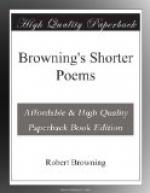8. =Shylock’s bridge=. By the Rialto. A house by the bridge, said to be Shylock’s, is still pointed out to visitors.
18. =clavichord=. An instrument of the type of the piano.
19 ff. =thirds=, =sixths=, etc. For the musical terms see an unabridged dictionary or a musical dictionary.
30. Compare the lines in Fitzgerald’s translation of the Rubaiyat:—
“For some we loved, the loveliest
and the best
That from his vintage rolling Time hath
prest,
Have drunk their cup a round or two before,
And one by one crept silently to rest.”
This is the characteristic note of poetic melancholy, found again and again from Virgil to Tennyson.
37-39. Is the ironical tone of these lines in harmony with the spirit of the rest of the poem?
What does Galuppi’s music mean to Browning? What does it recall of the life in Venice? Is the lightness of tone in the music itself or in the poet’s idea of Venice? What emotions are aroused? What causes the poet’s sadness? Is the verse musical? Does it suit the ideas it conveys?
ABT VOGLER. (PAGE 126.)
George Joseph Vogler, known also as Abbe (or Abt) Vogler (1748-1816), was a German musician. He composed operas and other musical pieces, became famous as an organist, and invented an organ with pedals and several keyboards. Browning seems to have in mind the complex musical harmonies of which the instrument was capable. See lines 10, 13, 52, 55, and 84 of the poem. See also the Encyclopaedia Britannica.
3. =Solomon=. Legends about Solomon and his power over the spirits of earth and air are common in Jewish and Arabic literature.
9 ff. =building=. The idea of building by music is an old one. See the classical story of Amphion and the walls of Thebes, Coleridge’s Kubla Khan, and Tennyson’s Gareth and Lynette, lines 272-274.
19. =rampired=. Furnished with ramparts.
23. The reference is to St. Peter’s in Rome.
The musician’s imagination takes fire from his playing, and his music seems like a glorious palace which he is building. The notes are conceived as spirits doing his bidding (stanzas i-iii). As he proceeds the images change, and heaven and earth seem to unite with him in his creative activity: light flashes forth, and heaven and earth draw nearer together. Now he sees the past, the beginnings of things, and the future; even the dead are back again in his presence. His imagination has anulled time and space. As he thinks of his art, it seems more glorious to him than painting and poetry: these work by laws that can be explained and followed, while music is a direct expression of the will, an act of higher creative power.
When the music ends he cannot be consoled by the thought that as good music will come again. So he turns to the one unchanging thing, “the ineffable Name.” Thus he gains confidence to say, “there shall never be one lost good.” All failure and all evil are but a prelude to the good that shall in the end prevail. So he returns in hope and patience to the C major, the common chord of life.




